|
|
|
Sort Order |
|
|
|
Items / Page
|
|
|
|
|
|
|
| Srl | Item |
| 1 |
ID:
113019
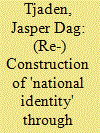

|
|
|
|
|
| Publication |
2012.
|
| Summary/Abstract |
Social constructivist theories regard the nation as 'imagined' (Anderson), 'invented' (Hobsbawm and Ranger), and 'narrated' (Bhabha). National narratives use mass rituals, performances, and selective national history to reinvigorate collective identity. This article examines the 1910 centennial festivities in Chile as a collective and discursive quest for national identity in a changing society longing for stability. The article uses a discourse analysis approach to study a series of Chilean national history abstracts and coverage of the centennial festivities as presented in Zig-Zag, the most relevant political magazine at the time. The study finds that selective memory and mass ritual discourse are a constitutive part of national identity. Through the process of selective memory, the sources depict Chilean history as a series of linear, coherent, and meaningful events to foster collective identification with the nation. The images of mass ritual discourse of the centennial celebrations reinforce common national characteristics and confidence in the nation. Mass performances provide emotional self-affirmation and an endowment of meaning for individuals within their national group as they restage current national membership with reference to a common past. The study identifies themes of national representation along which the nation is narrated, and suggests that this typology can be generalised beyond the case of Chile. In doing so, this article underscores the need for further research on the concept of discursive national identity formation and its relevance in contemporary politics.
|
|
|
|
|
|
|
|
|
|
|
|
|
|
|
|
| 2 |
ID:
137551
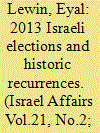

|
|
|
|
|
| Summary/Abstract |
The 2013 election campaign in Israel shows, at first glance, some unanticipated results and unexpected reactions of several political actors. Three events in particular can be noted: (1) the rise of a significant centrist middle-class party; (2) the association of the newly elected right-wing Prime Minister with his left-wing rivals; and (3) the revival of a national religious party after years of decline. A broad overview, however, reveals that from many perspectives numerous key elements of Israeli politics have remained broadly the same over the decades. Some unanticipated outcomes of the elections are to a substantial extent repetitions of past events, referred to in this paper as historic recurrences. In order to establish this claim about historic recurrence, each event is compared to past events with which several striking similarities are found. In order to explain the phenomenon of historic recurrence in Israeli politics, two sets of concepts are applied: the sociological terminology regarding reference group and collective identity, and rational choice theories about voter behaviour and the preferences of political actors.
|
|
|
|
|
|
|
|
|
|
|
|
|
|
|
|
| 3 |
ID:
082673
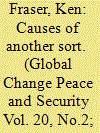

|
|
|
|
|
| Publication |
2008.
|
| Summary/Abstract |
The Islamic caliphate is a key competitor in the global ideological marketplace. Indeed, it has been called 'one possible configuration for a post-industrial politics' (Philip W. Sutton and Stephen Vertigans, 'Islamic "New Social Movements"?: Radical Islam, Al-Qa'ida and Social Movement Theory', Mobilization 11, no. 1(2006): 105). What is its nature? The answer illustrates the argument that the relationship between the informal conception of collective identity and its non-agentive interest in formal establishment is the ontological basis of international relations. This points the way toward resolution of the agent-structure problem with reference to evolutionary theory. Distinguishing between action and behaviour on the basis of subjecthood is useful, showing that actors' primary interest is self-identification through affirmation of an institutional ideal-state. Such ideational objects do not act, but those through which agents successfully constitute and affirm themselves are more likely to prosper strategically. The caliphate is one such. Thus, conceptions of collective identity behave, compete and evolve.
|
|
|
|
|
|
|
|
|
|
|
|
|
|
|
|
| 4 |
ID:
106284
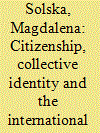

|
|
|
| 5 |
ID:
126930
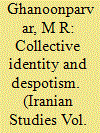

|
|
|
|
|
| Publication |
2013.
|
| Summary/Abstract |
With an overview of identity as a dominant theme in Bahram Beyzaie's artistic creations, this article examines two of his, arguably, most political plays: Chahar Sanduq (Four Boxes, 1967) and Khaterat-e Honarpisheh-ye Naqsh-e Dovvom (Memoirs of the Actor in a Supporting Role, 1981) to examine his reflections on the nature, function, and vulnerability of collective social, political, and cultural identity in authoritarian societies. Both plays illustrate that the tyrannical rulers of such societies perpetuate their dominance over their subjects through exploiting the individual's self-interests, thereby isolating him and stripping him of collective and, inevitably, individual identity. Beyzaie's allegorical and rather abstract approach in these plays contributes to conveying a less topical, culture-specific, and more universal message.
|
|
|
|
|
|
|
|
|
|
|
|
|
|
|
|
| 6 |
ID:
137624


|
|
|
|
|
| Summary/Abstract |
This study examines how collective identity based around military school ties influences an individual officer’s achievement in the military. The central premise of this study is that if collective identity can form the basis for fragmented social networks in the South Korean officer corps, it can result in different opportunities for members within different networks. The results presented here demonstrate that collective identities are important explanatory factors to account for this exchange of social resources. All else being equal, the exchange of instrumental and material resources is more likely between military officers who graduated from the same civilian or military school.
|
|
|
|
|
|
|
|
|
|
|
|
|
|
|
|
| 7 |
ID:
146682
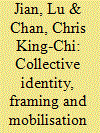

|
|
|
|
|
| Contents |
This study presents the case study of a collective action against a proposed industrial waste-water disposal project in the city of Qidong, Jiangsu province in 2012 to explore the role of collective identity in the formation and mobilisation of environmental protests in contemporary China. It is suggested that collective identity articulated through protest is not just a static property of a certain group of people based on their history, culture and locality. Collective identity also works as a flexible framing strategy that can be pragmatically constructed or reconstructed by the discontents, as it interacts with the specific political context in the process of mobilisation.
|
|
|
|
|
|
|
|
|
|
|
|
|
|
|
|
| 8 |
ID:
023783
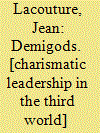

|
|
|
|
|
| Publication |
London, Secker and Warburg, 1971.
|
| Description |
viii, 300p.Hbk
|
| Contents |
Includes bibliography, index.
|
| Standard Number |
436240513
|
|
|
|
|
|
|
|
|
|
|
|
Copies: C:1/I:0,R:0,Q:0
Circulation
| Accession# | Call# | Current Location | Status | Policy | Location |
| 007752 | 923.1/LAC 007752 | Main | On Shelf | General | |
|
|
|
|
| 9 |
ID:
062105


|
|
|
| 10 |
ID:
175527
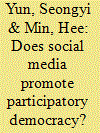

|
|
|
|
|
| Summary/Abstract |
This study examines whether social media contributed to the success of the Korean presidential impeachment protests of 2016–17 and promoted participatory democracy. The 2016–17 candlelight protests contributed to the overthrowing of a corrupt regime. However, was it a victory of participatory democracy? To answer this question, we must first be clear on what kind of participatory democracy is being referred to. Therefore, while social media played a crucial role in the success of the protests, the impact of social media on participatory democracy should be addressed separately. For this purpose, we first analyse the contributions of the digitally connected movements during the 2016–17 protests with two social movement theories: resource mobilisation and collective identity. Second, we examine whether the success of digitally connective movements during those protests promoted participatory democracy. To discuss this issue, we use Arnstein’s concept of a ‘ladder of participation’, which describes participatory democracy as falling within three levels, from non-participation through tokenism to citizen power. This study shows that the proliferation of social media politics by itself does not convert representative democracy into participatory democracy. This implies that even if social media augments citizens’ power of resistance, it cannot transform citizens into a governing power.
|
|
|
|
|
|
|
|
|
|
|
|
|
|
|
|
| 11 |
ID:
178599


|
|
|
|
|
| Summary/Abstract |
This article focuses on the construction and competition over Dersim identity that takes place in Dersim’s diaspora, which also creates the necessity to critically engage with the concepts of Euro-Turks and Euro-Kurds. In doing so, it argues that while the activities of Dersimlis in the Dersim diaspora in Europe and in Turkey enable new identity claims, they also perpetuate a sense of belonging that builds upon ethnic, religious and/or linguistic domination. The first section broadly reviews the theoretical discussions on the complexity and fluidity of collective identities, diasporic movements, and the role the intelligentsia plays in the construction and competition over the definition of collective identities in diasporas. Building on this framework, the second section introduces the case of Dersim, the region and its history, and discusses the role Dersim diaspora and its intelligentsia play in (re)defining Dersim’s collective memory and competing over the definition of Dersim’s identity.
|
|
|
|
|
|
|
|
|
|
|
|
|
|
|
|
| 12 |
ID:
102119


|
|
|
|
|
| Publication |
2011.
|
| Summary/Abstract |
This essay explores some of the reasons for the continuing power of racial categorization in our era, and thus offers some friendly amendments to the more optimistic renderings of the term post-racial. Focusing mainly on the relationship between black and white Americans, it argues that the widespread embrace of universal values of freedom and equality, which most regard as antidotes to racial exclusion, actually reinforce it. The internal logic of these categories requires the construction of the "other." In America, where freedom and equality still stand at the contested center of collective identity, a history of racial oppression informs the very meaning of these terms. Thus the irony: much of the effort exerted to transcend race tends to fuel continuing division.
|
|
|
|
|
|
|
|
|
|
|
|
|
|
|
|
| 13 |
ID:
129545
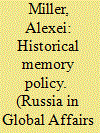

|
|
|
|
|
| Publication |
2014.
|
| Summary/Abstract |
History of Russia narrated as a sequence of only horrors and failures or, on the contrary, as a continuous string of victories and successes is equally unproductive for forming the individual and collective identity.
Active patriotism is a key element of a nation's human capital. Fostering active patriotism requires a consistent policy of memory, including an integral concept of Russia's past that would meet the strategic task of developing society and the state. The past twenty years have seen inefficient and inconsistent efforts to pursue such a policy. The result has been a semi-Soviet individual with almost no links with or emotional feelings for the history of his country and with no knowledge of it. World War II remains the only basic element of the memory policy; however, its emotional impact cannot but decrease with years. An active, consistent and competent policy of memory is needed. Attempts to do without ideology and without a policy of memory have led to disastrous results as regards the moral state of society. Like the state, society has lost its development vector. Instead of creative diversity, there is a destructive chaos in people's minds.
|
|
|
|
|
|
|
|
|
|
|
|
|
|
|
|
| 14 |
ID:
082784
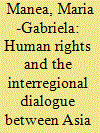

|
|
|
|
|
| Publication |
2008.
|
| Summary/Abstract |
Since the early 1990s, human rights have been a contentious issue for relations between the Association of Southeast Asian Nations (ASEAN) and the European Union (EU), especially in the Asia-Europe Meeting (ASEM). It is an issue that has constantly led to tensions in interregional cooperation. However, the ASEAN-EU dialogue on human rights has, in fact, had a significant impact on regional dynamics by stimulating the process of regional identity formation, especially in Southeast Asia. The core mechanism through which this development takes place is that of interaction, the process in which the two regional groupings engage while negotiating human rights policy. It can be argued, therefore, that interregional and intraregional human rights interactions are mutually dependent. ASEAN's rather confrontational mode of interaction with the European Union in relation to human rights has served as a catalyst for the dynamic growth of a collective definition of self in ASEAN. It has led to an 'essentialization' of ASEAN's idea of self as opposed to a common other, something which has undermined the possibility of maintaining an interregional dialogue that is not confrontational. However, it has also contributed to the development of a regional space for communicating about human rights and has thus played a central role in the gradual transformation of ASEAN's collective identity formation.
|
|
|
|
|
|
|
|
|
|
|
|
|
|
|
|
| 15 |
ID:
173838
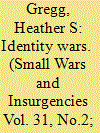

|
|
|
|
|
| Summary/Abstract |
Collective identity building is a critical component of most insurgent movements, including constructing a compelling cause with which individuals can identify and a sense of purpose and camaraderie. Counterinsurgencies, by contrast, devote surprisingly little attention to creating identities that compete with insurgents. Instead, they tend to focus on providing goods and services to vulnerable populations with the assumption that emotional resources, such as a sense of identity and purpose, are not necessary. This article draws from theoretical work on identity building to outline how collective identities are constructed, what they include, and how they shape human behavior. It then considers the U.S. led operations in Iraq from 2003–2011, and compares these efforts to the emergence of Sunni Islamist insurgencies in Iraq to investigate how insurgents used identity building, but counterinsurgents did not. It then applies this theoretical literature to construct a program for how counterinsurgents could include identity construction as part of its strategy to undermine insurgent movements.
|
|
|
|
|
|
|
|
|
|
|
|
|
|
|
|
| 16 |
ID:
127593
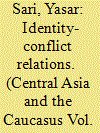

|
|
|
|
|
| Publication |
2013.
|
| Summary/Abstract |
This study aims to describe and explain the relations between identity and conflict by drawing on different theoretical approaches in political science. It examines the questions of whether collective identity, either on a national, civilizational, religious, or social level, is an important variable in trying to understand current conflicts, as well as the prospects for formulating identity-based approaches to conflict. In other words, is it even possible to think about collective identity and conflict simultaneously? This gives rise to another question: Why is collective identity an important factor for explaining the conflict in the Ferghana Valley?
The Ferghana Valley has played a role both in establishing stability in Central Asia and in becoming the starting point of violent conflict throughout the history of the region. The valley became administrationally and ethnically divided into several parts during the Soviet and post-Soviet era. Currently, the tension among the different ethnic, social, and political groups is high because of overpopulation, the increasing scarcity of water and arable land, and the economic hardships and social differentiation that occurred during the political, economic, and social transformation after the Soviet Union collapsed. The Ferghana Valley, at the heart of Central Asia, has become one of the most conflict-prone areas in Central Asia. For these reasons, the valley is a good area for testing the explanatory power of different approaches of political science to explain identity-conflict relations.
Ethnic issues are still extremely important for understanding much of the tension arising in the valley. Not only is there division among the Kyrgyz, Uzbek, and Tajik people, the issue is further complicated by the hostility between different identity-groups and minorities in the region. Additional pressure is arising due to the fact that not only does this tension exist inside each state, it could also escalate to the interstate level.
|
|
|
|
|
|
|
|
|
|
|
|
|
|
|
|
| 17 |
ID:
067260
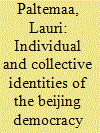

|
|
|
| 18 |
ID:
129928
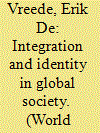

|
|
|
|
|
| Publication |
2014.
|
| Summary/Abstract |
rik De Vreede attempts to give a clearer view of the concepts of collective and national identities and describes integration processes in politics and society. He also discusses the interconnected key notions of culture, civilisation and identity, defines the plural society and analyses strategies and processes of integration and intercultural dialogue.
|
|
|
|
|
|
|
|
|
|
|
|
|
|
|
|
| 19 |
ID:
104108
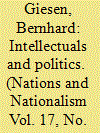

|
|
|
|
|
| Publication |
2011.
|
| Summary/Abstract |
By imagining their audiences, intellectuals invented and constructed the collective identities of nations and transnational communities like Europe or humankind. Four ideal types of intellectuals are outlined by describing them in their relation to politics: the intellectual as cosmopolitan ascetic; the intellectual as enlightened legislator; the intellectual as revolutionary; and the intellectual as the voice of a traumatic memory. These ideal types change over time in response to their focus of attention and their mode of communication. Because of changes in their media (from handwritten to printed books) and changes in their written language (from Latin to French and Italian, and further to vernacular languages), intellectuals were able to change views on past, present and future times. Today, they are involved in (civic) resistance but rarely in politics per se. By renewing the tension of the sacred and profane - the so-called axial-age revolution - contemporary intellectuals in Eastern Europe are decoupled from direct political power.
|
|
|
|
|
|
|
|
|
|
|
|
|
|
|
|
| 20 |
ID:
192965
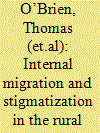

|
|
|
|
|
| Summary/Abstract |
Eastern Europe has seen considerable social, economic and political upheaval since 1989. Migration has been an important element of this change, with the removal of restrictions enabling individuals to move in search of opportunities. Resulting patterns of internal migration rest on a longer history of movement, linked to the communist-era pursuit of economic development and modernization. Proximity to Western Europe has seen some regions receive greater migrant flows, leading to resentment and distancing among the resident population. Focusing on rural settlements in the Banat region, southwestern Romania, this article examines how receiving communities perceive the effects of internal migration. The findings suggest entrenched stereotypes established during the communist-era remain prominent in patterns of stigmatization and maintenance of social distance. They also point to underlying tensions between the desire to protect local culture and tradition, while ensuring the continued viability of small settlements in the face of threats of depopulation.
|
|
|
|
|
|
|
|
|
|
|
|
|
|
|
|
|
|
|
|
|